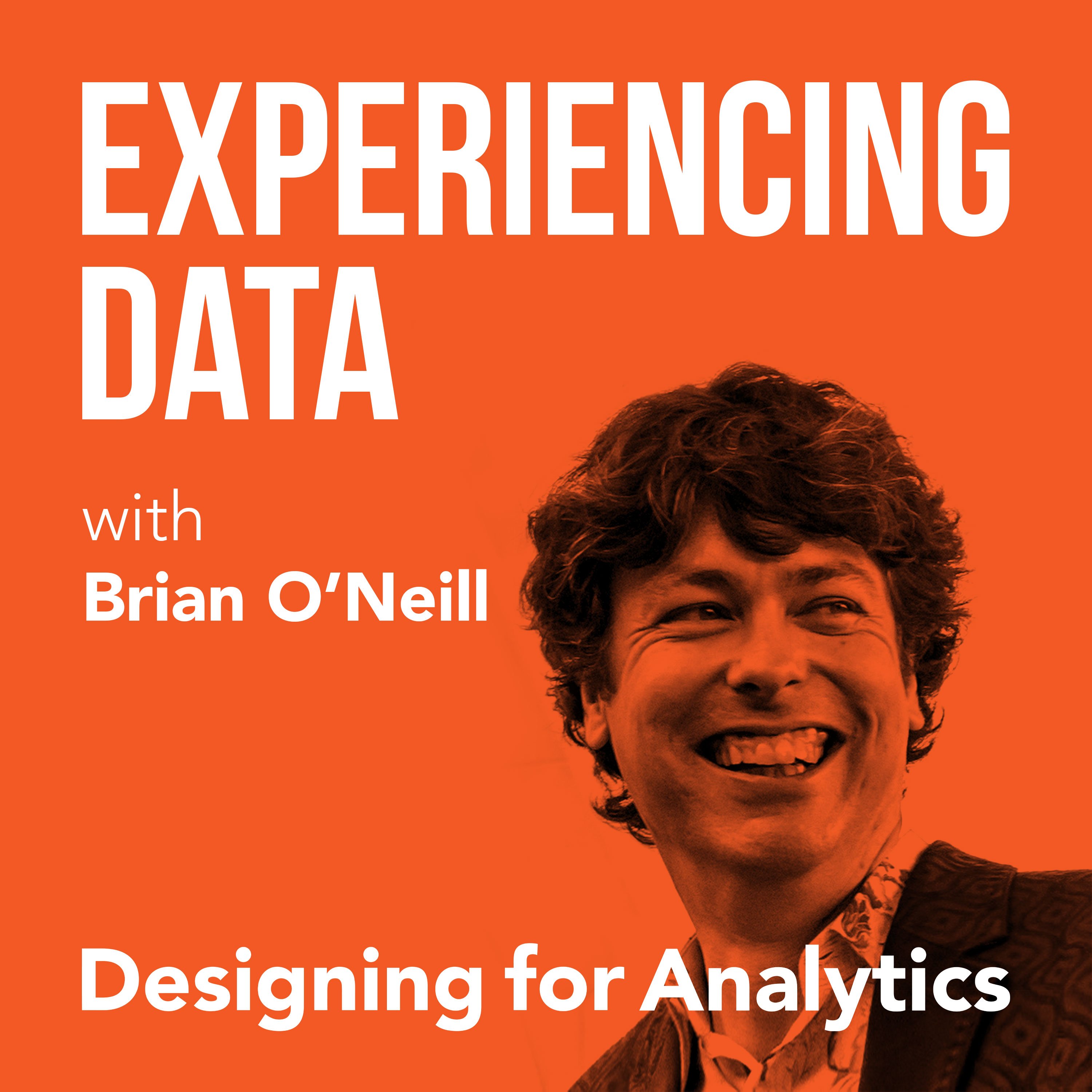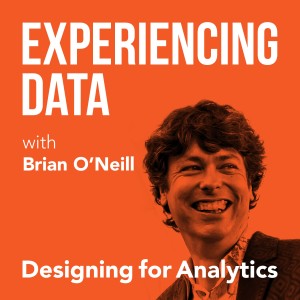

154.1K
Downloads
184
Episodes
Is the value of your enterprise analytics SAAS or AI product not obvious through it’s UI/UX? Got the data and ML models right...but user adoption of your dashboards and UI isn’t what you hoped it would be?
While it is easier than ever to create AI and analytics solutions from a technology perspective, do you find as a founder or product leader that getting users to use and buyers to buy seems harder than it should be?
If you lead an internal enterprise data team, have you heard that a ”data product” approach can help—but you’re concerned it’s all hype?
My name is Brian T. O’Neill, and on Experiencing Data—one of the top 2% of podcasts in the world—I share the stories of leaders who are leveraging product and UX design to make SAAS analytics, AI applications, and internal data products indispensable to their customers. After all, you can’t create business value with data if the humans in the loop can’t or won’t use your solutions.
Every 2 weeks, I release interviews with experts and impressive people I’ve met who are doing interesting work at the intersection of enterprise software product management, UX design, AI and analytics—work that you need to hear about and from whom I hope you can borrow strategies.
I also occasionally record solo episodes on applying UI/UX design strategies to data products—so you and your team can unlock financial value by making your users’ and customers’ lives better.
Hashtag: #ExperiencingData.
JOIN MY INSIGHTS LIST FOR 1-PAGE EPISODE SUMMARIES, TRANSCRIPTS, AND FREE UX STRATEGY TIPS
https://designingforanalytics.com/ed
ABOUT THE HOST, BRIAN T. O’NEILL:
https://designingforanalytics.com/bio/
Episodes

Tuesday Jun 11, 2024
Tuesday Jun 11, 2024
Wait, I’m talking to a head of data management at a tech company? Why!? Well, today I'm joined by Malcolm Hawker to get his perspective around data products and what he’s seeing out in the wild as Head of Data Management at Profisee. Why Malcolm? Malcolm was a former head of product in prior roles, and for several years, I’ve enjoyed Malcolm’s musings on LinkedIn about the value of a product-oriented approach to ML and analytics. We had a chance to meet at CDOIQ in 2023 as well and he went on my “need to do an episode” list!
According to Malcom, empathy is the secret to addressing key UX questions that ensure adoption and business value. He also emphasizes the need for data experts to develop business skills so that they're seen as equals by their customers. During our chat, Malcolm stresses the benefits of a product- and customer-centric approach to data products and what data professionals can learn approaching problem solving with a product orientation.
Highlights/ Skip to:
- Malcolm’s definition of a data product (2:10)
- Understanding your customers’ needs is the first step toward quantifying the benefits of your data product (6:34)
- How product makers can gain access to users to build more successful products (11:36)
- Answering the UX question to get past the adoption stage and provide business value (16:03)
- Data experts must develop business expertise if they want to be seen as equals by potential customers (20:07)
- What people really mean by “data culture" (23:02)
- Malcolm’s data product journey and his changing perspective (32:05)
- Using empathy to provide a better UX in design and data (39:24)
- Avoiding the death of data science by becoming more product-driven (46:23)
- Where the majority of data professionals currently land on their view of product management for data products (48:15)
Quotes from Today’s Episode
- “My definition of a data product is something that is built by a data and analytics team that solves a specific customer problem that the customer would otherwise be willing to pay for. That’s it.” - Malcolm Hawker (3:42)
- “You need to observe how your customer uses data to make better decisions, optimize a business process, or to mitigate business risk. You need to know how your customers operate at a very, very intimate level, arguably, as well as they know how their business processes operate.” - Malcolm Hawker (7:36)
- “So, be a problem solver. Be collaborative. Be somebody who is eager to help make your customers’ lives easier. You hear "no" when people think that you’re a burden. You start to hear more “yeses” when people think that you are actually invested in helping make their lives easier.” - Malcolm Hawker (12:42)
- “We [data professionals] put data on a pedestal. We develop this mindset that the data matters more—as much or maybe even more than the business processes, and that is not true. We would not exist if it were not for the business. Hard stop.” - Malcolm Hawker (17:07)
- “I hate to say it, I think a lot of this data stuff should kind of feel invisible in that way, too. It’s like this invisible ally that you’re not thinking about the dashboard; you just access the information as part of your natural workflow when you need insights on making a decision, or a status check that you’re on track with whatever your goal was. You’re not really going out of mode.” - Brian O’Neill (24:59)
- “But you know, data people are basically librarians. We want to put things into classifications that are logical and work forwards and backwards, right? And in the product world, sometimes they just don’t, where you can have something be a product and be a material to a subsequent product.” - Malcolm Hawker (37:57)
- “So, the broader point here is just more of a mindset shift. And you know, maybe these things aren’t necessarily a bad thing, but how do we become a little more product- and customer-driven so that we avoid situations where everybody thinks what we’re doing is a time waster?” - Malcolm Hawker (48:00)
Links
- Profisee: https://profisee.com/
- LinkedIn: https://www.linkedin.com/in/malhawker/
- CDO Matters: https://profisee.com/cdo-matters-live-with-malcolm-hawker/
No comments yet. Be the first to say something!